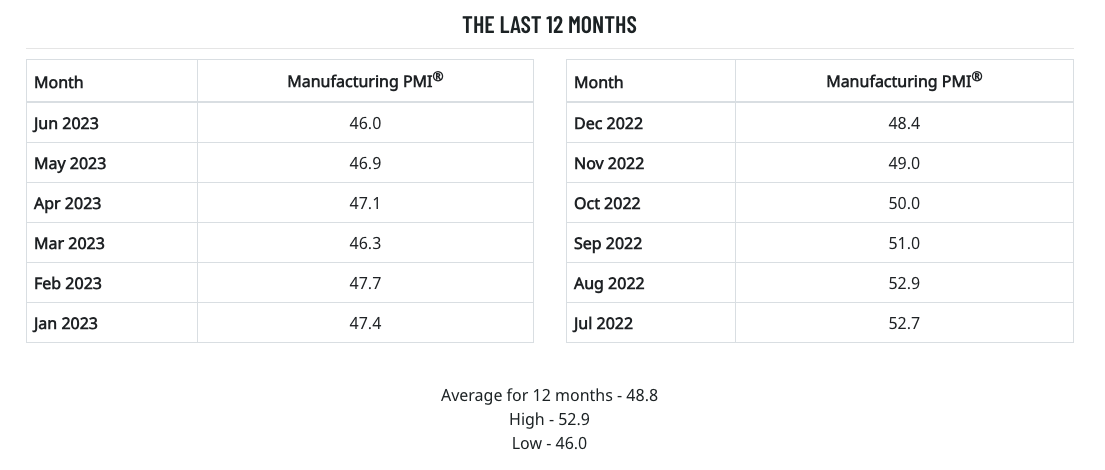In the latest Manufacturing ISM Report On Business, supply executives said that economic activity in manufacturing sectors contracted in June for the eighth consecutive month. The eight months of contraction started following a 28-month period of growth, according to the Institute for Supply Management.
The June Manufacturing PMI registered 46.0%, 0.9 percentage points lower than the 46.9% recorded in May. June’s reading was the lowest since May 2020’s 43.1%.
“Regarding the overall economy, this figure indicates a seventh month of contraction after a 30-month period of expansion,” said Timothy R. Fiore, CPSM, C.P.M., Chair of the ISM. “The New Orders Index remained in contraction territory at 45.6%, 3 percentage points higher than the figure of 42.6% recorded in May. The Production Index reading of 46.7% is a 4.4-percentage point decrease compared to May’s figure of 51.1%. The Prices Index registered 41.8%, down 2.4 percentage points compared to the May figure of 44.2%. The Backlog of Orders Index registered 38.7%, 1.2 percentage points higher than the May reading of 37.5%. The Employment Index dropped into contraction, registering 48.1%, down 3.3 percentage points from May’s reading of 51.4%.”

Fiore said the Supplier Deliveries Index figure of 45.7% is 2.2 percentage points higher than the 43.5% recorded in May. That figure is the Supplier Deliveries Index’s lowest reading since March 2009 (43.2%), Fiore said.
A reading of above 50% indicates slower deliveries, which is typical as the economy improves and customer demand increases.
The Inventories Index dropped 1.8 percentage points to 44%; the May reading was 45.8%. The New Export Orders Index reading of 47.3% is 2.7 percentage points lower than May’s figure of 50%. The Imports Index remained in contraction territory, registering 49.3%, 2 percentage points higher than the 47.3% reported in May.”
Here is a sample of ISM manufacturing PMI survey respondent commentary for June:
- “The slowing U.S. economy is causing the business forecast to be revised/reduced for the remainder of 2023. Customers are less inclined to purchase far in advance.” [Computer & Electronic Products]
- “Customer orders have definitely slowed down. Our company thought the second half of 2023 would be better than the first half, but this doesn’t seem to be the case.” [Chemical Products]
- “There were concerns that second-quarter sales were going to decrease and result in inventory levels rising; however, demand has remained stable so far. Projecting total end-of-year sales to be about where we were last year.” [Transportation Equipment]
- “There is an elevated level of capital project review as recession concerns loom. While not delayed, spending and planning are being managed and prioritized.” [Food, Beverage & Tobacco Products]
- “Markets are stabilizing in the second quarter of 2023 and appear to be trending downward for most commodity chemicals; however, demand versus supply has shifted to customers’ favor.” [Petroleum & Coal Products]
- “Orders and business are steady with a healthy backlog, but new prospective orders seem to be getting pushed back into 2024.” [Machinery]
- “North American demand stabilizing, but European markets showing slowing in the second half of 2023 and 2024.” [Fabricated Metal Products]
- “Here we are almost halfway through the year, and while things are challenging, we may be doing all right.” [Nonmetallic Mineral Products]
- “Input costs for materials continue to decline. Demand is trending to about 2019 levels, accounting for inflation. The COVID-driven demand has moderated.” [Paper Products]
- “Maintaining a strong order backlog. Continue to struggle with hiring hourly factory workers and finding qualified management candidates — higher turnover than desired. Pricing has stabilized, but labor costs remain high.” [Primary Metals]
Read more about the latest report here.
Related Posts
-
It was the index's ninth straight month of decline, and third straight in contraction territory.
-
The well-regarded barometer of U.S. manufacturing rose for the first time since August, but remains…
-
The Institute for Supply Management’s monthly Purchasing Managers Index (PMI) remained in contraction territory for…





